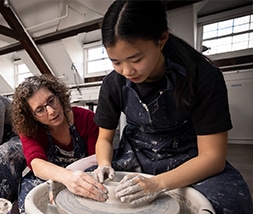Spectrum Assembly with Winsor Alum Whit Washington ’07
March 7, 2024—“Representation matters, that is part of the reason I wanted to come back today,” shared Whit Washington ’07, who also told students, “I really struggled at Winsor.” Now “an attorney to watch” according to Washington Lawyer Magazine and the National LGBT BAR Association, Washington is an attorney and legal fellow working mainly with incarcerated individuals. They returned to campus to speak with students during Spectrum’s all-school assembly held in the David E. and Stacey L. Goel Theater ahead of spring break.
Spectrum is a safe, inclusive place for the LGBTQ+ community and allies to come together at Winsor. Sharing opinions on politics that relate to the LGBTQ+ community and talking about experiences, the club is a space to support one another.
Spectrum club heads kicked off assembly with a vocabulary lesson, reminding everyone of the definitions of several words, including gender, sex, transgender, transexual, and nonbinary. After pointing to historic evidence and ancient remains from 3,000 B.C.E. that indicate trans individuals have been a part of society for millenia, they highlighted trans historical figures such as Marsha P. Johnson, Christine Jorgensen, Old Mrs. Nash, and Harry Allen, who have collectively paved the way for our current-day understanding. And yet “the debate around transgender existence has turned political,” said the club heads, as they set the stage for Washington to talk about transgenderism and the evolving narrative of transgender rights in the United States.
“My work has focused on that intersection of race and gender,” explained Washington, who came out as queer during college while exploring questions such as “Why did I feel so other? Why did I feel that I didn’t fit in? What are the social pieces, the psychological pieces?”
“The second time I came out was as a trans individual,” they shared. Now identifying as Black, queer, and trans, Washington explained the process of social transitioning. “I started wearing more masculine clothes, I cut my hair, I asked people to call me Whit instead of Whitney.” The result was ultimately life changing. “I wasn’t so lost in the world and in space. There is an aspect of existing that is much easier for me now,” said Washington.
They went on to discuss the ways in which the criminal legal system controls, disempowers, and limits rights, as well as the “very close relationship between slavery and prison labor,” and how vulnerable individuals end up in a survival economy “because they can’t support themselves through the mainstream economy.”
In closing, Washington told students, “You are great just for existing. It’s not because of your singing voice, your grades, your clubs—it’s you.”
They reminded students “there is a whole world out there,” and urged, “allow yourself to be expansive about who you are and what you do. If you’re shrinking yourself to fit in, you’re not doing yourself or the people around you a service. Let people get to know you, let people love you.”






